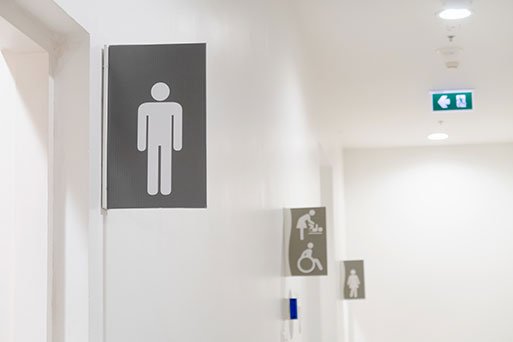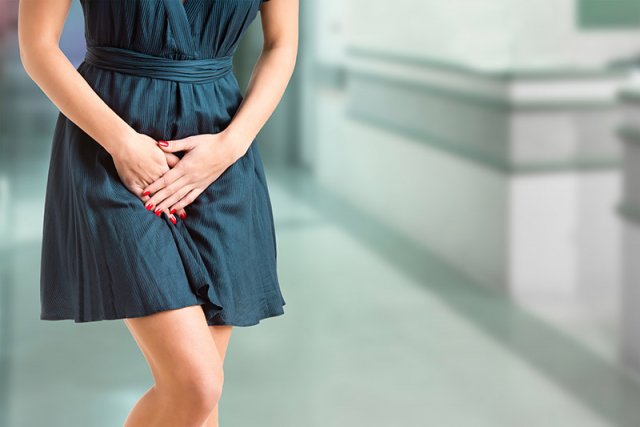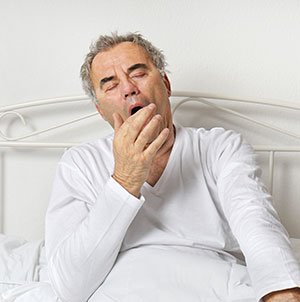Frequent Urination
Constant Urge to Urinate: Finding Causes and Alleviating Symptoms
Frequent urination or the constant urge to urinate is not a disease in itself. Rather, frequent trips to the toilet can be a symptom of very different illnesses. Frequent urination is divided into three forms depending on its severity:
- Polyuria: Instead of the usual 1 to 2 liters, up to 3 liters or more of urine are excreted within 24 hours. Very often there is also a strong urge to urinate.
- Pollakiuria: Very frequent urination (more than 10 times in 24 hours) with only small amounts of urine. The total amount of urine excreted may be normal or increased.
- Nocturia: Frequent urge to urinate at night with repeated interruptions to sleep. The need to urinate regularly more than twice a night.
Many people feel uncomfortable talking to their doctor about urinary problems. However, as various conditions that are accompanied by frequent urination can range from harmless to serious, those affected should definitely inform their doctor so that the actual cause of the frequent urination can be clarified.
Our Medical Specialists Will Be Happy to Provide You With More Information
Please feel free to contact us for a consultation. The specialists at our Hirslanden Continence Center in Zurich will provide you with information about your individual assessment and treatment options for frequent urination.
Polyuria - Frequent Urination with a Lot of Urine
Symptoms & Causes of Polyuria
Polyuria is the term used by doctors to describe the abnormally increased production and excretion of urine, whereby the normal value of 2 liters per day is exceeded. This symptom is often accompanied by a greater feeling of thirst and a strong urge to urinate. The urine is typically light to almost colorless. Affected patients find the frequent urination very disturbing and disruptive in everyday life.
Polyuria can have organic, hormonal, medicinal or even psychological causes. Common causes of polyuria in adults and children include:

- Irritable bladder
- Inadequately treated diabetes mellitus,
- Diabetes insipidus (hormonal cause of increased, unfocused urine production)
- Renal insufficiency
- Hypercalcemia, elevated calcium level
- Hypokalemia, potassium deficiency
- Medication, so-called diuretics (water tablets)
- Mental strain and stress, e.g. exam nerves, separation, important appointments
- Heavy caffeine or alcohol consumption
Frequency and Amount of Urination: What is Normal?
The urinary bladder stores urine produced by the kidneys. The bladder capacity in men is between 400 and 600 ml, whereas in women it is between 400 and 500 ml. Normally, the bladder signals several times during the day that it is nearly full and needs to be emptied soon.
A healthy person empties their bladder every few hours, between four and six times a day. The actual frequency depends on drinking and eating habits, external influences, and many other factors. People who consume large amounts of fluid or water-rich foods will feel the need to urinate frequently throughout the day. Caffeinated and alcoholic beverages can also noticeably increase the urge to urinate. Urinating up to ten times within 24 hours is still considered normal when consuming such beverages and foods. However, if you need to go to the toilet more frequently over a longer period of time or if the total amount of urine exceeds 2 liters, you should consult a doctor.
Pollakiuria - Frequent Urination with Little Urine
 Symptoms & Causes of Pollakiuria
Symptoms & Causes of Pollakiuria
Frequent urination usually develops gradually. As soon as the interval between two urinations is significantly less than two hours, the constant urge to urinate begins to have a negative impact on professional and private life. The person affected tries - largely unconsciously at first - to come to terms with the condition: The amount they drink is restricted and their surroundings are scanned for the presence and easy accessibility of a toilet.
Once an hourly voiding frequency (or more often) is reached, frequent toilet visits become a real problem for many sufferers, which can no longer be easily integrated into the normal daily routine. At this point, frequent urination becomes a symptom of a possible bladder disorder. However, those affected react very differently to this problem: a few quickly seek the advice of a doctor and push for a solution, but the vast majority try to cope with bladder weakness on their own for many years.
Women between the ages of 30 and 60 in particular suffer from frequent urination with only weak urine output. In addition to a lack of oestrogen, chronic infections of the pelvic organs and psychosomatic causes are also suspected. Frequent urination in children can also indicate cystitis.
Frequent urination during the day can indicate an overactive bladder (irritable bladder) or be a symptom of another condition, including:
- Urge incontinence
- Cystitis with frequent urination in small amounts, possibly with pain
- For men: prostate enlargement
- Kidney or bladder stones
Frequent urge to urinate with only a small amount of urine excreted can also occur in connection with a bladder emptying disorder, in which the process of emptying the bladder is impaired for various reasons. Because a large amount of residual urine remains in the bladder after going to the toilet, the bladder sends a signal to the brain that it has reached its capacity limit after a short time.
Incidentally, frequent urination is a normal side effect of pregnancy, as the growing baby and the enlarged uterus put pressure on the bladder, urinary tract and other pelvic organs and can therefore cause frequent urination and voiding difficulties.
Nocturia: Frequent Urination at Night
Nocturnal urination should be the exception, for example in the case of above-average fluid intake in the evening. If those affected regularly have to get up more than twice a night to relieve themselves, the doctor speaks of clinically significant nocturia. The regular, repeated interruption of sleep often leads to further symptoms such as headaches, chronic fatigue and concentration problems. Depressive moods and even social isolation can also be the result.
It is often older people (aged 55 and over) who are affected by the unpleasant effects of the urge to urinate at night. However, many people are very uncomfortable discussing the problem with a doctor. Frequent urination at night is usually accepted as an unavoidable condition of old age and sometimes even played down by doctors. For those affected, however, the urge to urinate at night is a burden that severely restricts their quality of life. It is not widely known that nocturnal urination is also common among younger people. However, whether young or old, in many cases the symptoms are caused by another condition that can or should be treated. In most cases, frequent urination at night can be alleviated or even stopped.
One cause of frequent urination at night can be increased urine production during the night, which can indicate a reduced cardiac output or a hormonal disorder. An enlarged prostate can also irritate the bladder in men and lead to nocturnal urination.

Causes of excessive urination at night can include
- Heart failure
- High blood pressure
- Diabetes mellitus, diabetes insipidus
- Parathyroid hyperfunction
- Kidney disease with increased urine output (polyuria)
- Heavy alcohol consumption
- Medication (so-called diuretics)
- Prostatic hyperplasia (benign enlargement of the prostate)
Get Further Information on Clarifying Frequent Urination
Contact us if you would like a detailed consultation. We will be happy to inform you about your individual assessment and treatment options for constant urinary urgency or frequent nighttime urination. You can reach our center (Hirslanden Continence Center) in Zurich by phone at +41 44 387 29 10 Monday through Friday between 6 a.m. and 5 p.m. You are also welcome to use our online appointment scheduling service!
Diagnosis and Treatment for Frequent Urination
In order to get to the bottom of the causes of the frequent urge to urinate, a detailed medical history is mandatory. The doctor will probably ask the following questions:
- Does the frequent urge to urinate occur during the day or at night?
- Can you pass a lot or a little urine when you urinate?
- Are you often very thirsty?
- Do you have pain when urinating?
- Are you taking medication, for example a diuretic for heart failure or high blood pressure?
- How much do you usually drink during the day and what do you drink?
- Do you drink a lot of coffee or tea? Or do you drink a lot of alcohol?
After the initial consultation, blood and urine tests are usually carried out. An ultrasound examination of the urinary tract may also be carried out. Based on the patient's symptoms, the physical examination may include a residual urine determination, urethral dilatation examination and smear test and, if necessary, urodynamics including uroflowmetry, X-ray examination or urethrocystoscopy (urethroscopy and cystoscopy).
It can also be helpful for the diagnosis that patients keep a micturition diary in which they record the micturition times, the amount of urine excreted and drinks consumed over 3 days.
The treatment of constant or frequent urination always depends on the cause. Because frequent urination can be caused by various diseases, treatment is primarily aimed at treating the underlying disease. This means that very different types of therapy can be used, aimed at treating diabetes, bladder inflammation or prostate enlargement, for example. If medication is responsible for the increased urge to urinate, the treating doctor may consider a substitute preparation or changing the dose of diuretics. The aim of treating the underlying disease is to improve the patient's general condition and alleviate the symptoms of frequent urination.
Medication can be used to support symptomatic treatment. In men, so-called alpha blockers have proven effective in relaxing the prostate muscles. For women, a local preparation containing oestrogen can be used.
Under no circumstances should those affected restrict their fluid intake due to the frequent urge to urinate. This can deprive the body of too much fluid. Instead, limit the consumption of diuretic drinks such as coffee, tea, beer or sparkling wine.
Get in Touch with Our Experts
Contact us for a consultation, we will be happy to inform you about your individual assessment and treatment options for frequent urination.
